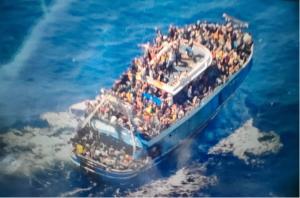The ongoing climate crisis and regional wars are rapidly increasing the number of people seeking safety. The World Bank observes that by 2025, 143 million people may be compelled to migrate as climate change worsens. It would seem to be a time for compassion and accommodation. But the European Union’s response to such desperate people has primarily been to bolster its own borders and force countries outside the EU to keep migrants away, in a practice called “externalization.”
On June 14, nearly 700 people drowned when the overloaded fishing boat Adriana capsized off the coast of Greece. Most were women and children; many were coming from Pakistan, Afghanistan, Egypt, Syria, and Palestine. Democracy Now and some mainstream news reported that their deaths reveal ghastly discrepancies of race and class when compared with the rapid, all-out attempt to rescue five wealthy submariners lost near the wreck of the Titanic.
NGOs that track migrating people noted that the Greek Coast Guard and EU border patrol Frontex let the Adriana founder and drift for 13 hours. And when a Greek Coast Guard vessel did attempt a tow, it was to shift responsibility by hauling the boat to Italian waters. Unfortunately, the boat immediately capsized and sank. This “looks like what the Greeks have been doing since March 2020 as a matter of policy, which is pushbacks and trying to tow a boat to another country’s water in order to avoid the legal responsibility to rescue,” Omer Shatz, legal director of NGO Front-LEX, told CNN. “Because rescue means disembarkation and disembarkation means processing of asylum requests.”
This is a terrible tragedy and an awful confluence of structural biases. It is a horrible, but all too common occurrence. And it doesn’t happen accidentally; the European Union adopted policies that essentially ensure these outcomes by externalizing the problem.
The 2016 EU-Turkey Statement requires Turkey to return all irregular migrants. That country does not allow non-Europeans to qualify for refugee status.
The EU’s 2020 Cotonou Agreement with the African, Caribbean and Pacific (ACP) states links development aid to the “normalization of migration flows.”
And on July 16, 2023, the EU signed a pact with Tunisia, the main departure point, that provides $118 million dollars (90 million Euros) in aid providing that country prevents North African migrants from crossing the Mediterranean to the EU. President Kais Saied of Tunisia readily agreed. The BBC reports that the president had previously accused migrants of partaking in a “plot” to change the country’s demographic profile. Human rights groups, Libyan authorities and survivors report that Tunisia dumps people seeking refuge in the desert where many die.
The EU reports that 72,000 migrants did successfully survive the hazardous journey this year, mostly to Italy, but those deemed economic migrants (as opposed to asylum seekers) are sent back or to a third country.
Global living situations will continue to worsen for an ever-growing number of the world’s inhabitants. It seems unlikely that the climate crisis can be averted but more humans can be spared by developing new policies that put people’s needs foremost.
“The EU must put safety and solidarity at the heart of its action in the Mediterranean. In view of the increased movements of refugees and migrants in the Mediterranean, collective efforts, including greater coordination between all Mediterranean States, solidarity, and responsibility-sharing, as reflected in the EU’s Pact on Migration and Asylum are essential to save lives…” said Gillian Triggs, UNHCR Assistant High Commissioner for Protection.
These sentiments are echoed by Federico Soda, IOM Director for the Department of Emergencies, who said “It is clear that the current approach to the Mediterranean is unworkable. Year after year, it continues to be the most dangerous migration route in the world, with the highest fatality rate. States need to come together and address the gaps in proactive search and rescue, quick disembarkation, and safe regular pathways. These collective efforts should have the human rights of migrants and saving lives at the center of any response.”
So, why not open borders and use 1,000-passenger cruise ships to transport people to countries that suffer from shrinking workforces or other areas where health and well-being can be sustained? This would surely be an improvement on smugglers using unsafe vessels.
If the current world elite in the EU and other prosperous nations will not overcome their xenophobia, racism, and profit-bound budgets, then working people, allied with indigenous and oppressed nations of the world, must vie for power and swiftly replace those misleaders.
*Featured image: An undated handout photo provided to the New York Times by the Greek Coast Guard showing migrants onboard the Adriana before it capsized off the coast of Greece. Credit: Hellenic Coast Guard/Reuters
References
Tunisia-EU migration: Deal signed to strengthen borders – BBC News
https://www.bbc.com/news/world-africa-66222864
https://www.kbc.co.ke/tunisia-signs-border-policing-deal-with-eu/
https://www.infomigrants.net/en/post/30527/what-happens-to-migrants-who-are-rescued-at-sea-and-land-in-italy
Towards an Effective and Principled EU Migration Policy Recommendations for Reform by Human Rights Watch, June 2018
https://www.hrw.org/sites/default/files/supporting_resources/hrw_eu_migration_policy_memo_0.pdf
The Integration of Recent Migrants and Refugees: A Review of Research on Integration Policy Practices in the EU by Albert Kraler Danube University, Krems Austria; published around 2020 by SPRING, an EU-funded project focusing on the integration of recently arrived migrants in the context of the large-scale arrivals of refugees and other migrants since 2014.
https://integrationpractices.eu/wp-content/uploads/2022/12/Review-Report-Public.pdf
EU Migration Policy: The EU as a Questionable Actor and a Realist Power by Julia Amorim,
https://www.e-ir.info/pdf/97769
Adjusting to a World in Motion: Trends in Global Migration and Migration Policy by Douglas J. Besharov (ed.), Mark H. Lopez (ed.) Oxford university Press, 2016, Chapter 9: EU Migration Policies and External Relations
https://academic.oup.com/book/26449/chapter/194864341
Rethinking EU external migration policy: contestation and critique by Bruno Oliveira Martins & Michael Strange GLOBAL AFFAIRS 2019, VOL. 5, NO. 3, 195–20 https://www.tandfonline.com/doi/epdf/10.1080/23340460.2019.1641128?needAccess=true&role=buttonhttps://www.tandfonline.com/doi/epdf/10.1080/23340460.2019.1641128?needAccess=true&role=button
IOM News-Global- 16 June 2023
IOM and UNHCR Call for Decisive Action Following Mediterranean Tragedy
https://www.iom.int/news/iom-and-unhcr-call-decisive-action-following-mediterranean-tragedy
A Titanic Disparity in How the World Responds to Maritime Disasters
By Amy Goodman & Denis Moynihan ,Democracy Now; June 22, 2023
https://www.democracynow.org/2023/6/22/a_titanic_disparity_in_how_the
